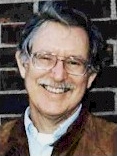30 Years of NDE Research: an interview with Ken Ring
 When and why did you cease doing work on NDEs?
When and why did you cease doing work on NDEs?
I wrote my last substantial article on NDEs, and gave my last public talk on the subject, in 2000. By that time, I had been studying, writing about, and lecturing on NDEs for 23 years; I was approaching 65, and felt that it was time for me to hang up my NDE spikes, as it were, and move on to other things.
It wasn't just that I felt I had had my chance to have my say, but there was something else that prompted this decision — although I know this might sound to some like a mere rationalization, or maybe even a self-serving delusion! But anyway, for a long time I had felt myself to be in service to the Light, and tried to conduct my work in this spirit. However, as the end of the millennium approached, I had the distinct inner sense that I was somehow being "released" from my contract and, to make a bit of a joke about it, was given the equivalent of "a golden handshake."
Of course, I don't mean to give myself airs — I just felt that it was time for me to go. But I would never want people to think I ever lost my interest in NDEs, simply because I no longer want to be actively involved in the field. On the contrary, to this day I have maintained contacts with some of my colleagues and some of my NDEr friends, and I have continued to try to help researchers, students and others in their work, and NDErs, too – just in a more private, and more-or-less publicly invisible capacity. I would like people who still remember me to know that I will always regard my work in the field of near-death studies as the blessing of my life, and as the greatest privilege I have ever been granted.
What was your relationship to IANDS and how do you feel about it now?
I guess I am one of the lucky ones who "was there at the beginning." IANDS was effectively born at the University of Connecticut in December, 1980, and was incorporated officially on February 19, 1981. Its co-founders were Bruce Greyson, John Audette and myself. And in the beginning, it was a purely volunteer organization, mostly run by some of my students. With their help and with the help of many others who soon came on board, I was able to oversee its functioning during its early years, but my formal association with IANDS ended in 1983. After that time, Nancy Evans Bush took over the management of the organization and she, perhaps more than anyone else in its history, deserves the credit for steering it through some very perilous years. Of course, there were many others over the years who played an important part in the IANDS story, and from a professional standpoint, the single most significant person for the long haul has been Bruce Greyson, who, as everyone will know, was the longtime editor of our journal and the director of IANDS' research operations.
Naturally, it is very gratifying to know that IANDS has not only survived but flourished for the last three decades, and that during that time there have been many branches in other countries as well (even though not all of them are extant). In my day, I was fortunate to visit or address quite a few of these groups, as well as to participate in a number of IANDS national conferences here. But, really, after having helped midwife IANDS into this world, I had very little to do with its growth and can claim no credit for that – that rightly belongs to so many others.
So if there's life after IANDS and NDEs, what have you been up to in recent years?
Well, I left the University of Connecticut in December, 1996, when I was 61, and moved back to the Bay Area in California, where I had grown up. After writing the last of my NDE books, I have continued to work and write – just on other subjects. For example, I wrote a couple of books on some composers of classical music – Saint- Saëns, Janacek, Tchaikovsky, and Elgar – and penned a few privately printed memoirs. A few years ago, I got interested and then involved in the Palestinian/Israeli conflict, went to the West Bank, and eventually wrote a book about the lives of contemporary Palestinians, entitled Letters from Palestine. At this point, having recently completed three-quarters of a century on this planet, and having just finished another memoir, I think I am finally done writing books! From now on, I just hope to continue reading them, but one never knows what's around the corner. Still, sometimes it's enjoyable to look back on my life and see that I was a part of something, namely IANDS, that has helped to bring about a new and comforting understanding of death, which in turn has helped many to fear it less, and to learn the importance of living with love for all things, including the privilege of life itself.
